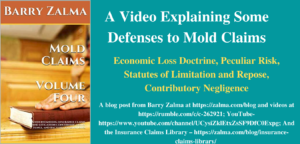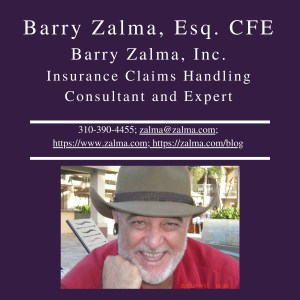A Video Explaining Some Defenses to Mold Claims

See the full video at https://rumble.com/vqu68o-a-video-explaining-some-defenses-to-mold-claims.html and at https://youtu.be/0EGQf6SUjMQ
Economic Loss Doctrine
“ The economic loss doctrine is a judicially created doctrine providing that a commercial purchaser of a product cannot recover from a manufacturer, under the tort theories of negligence or strict products liability, damages that are solely ‘economic’ in nature.” It is a defense to tort claims that arise in construction matters and, in all claims, relating to property damage due to mold. Under the economic loss doctrine, a plaintiff who suffers only financial injury (as opposed to personal injury or emotional distress, or damage to real or personal property) as a result of another’s actions cannot seek recovery in tort. Instead, the plaintiff is limited only to recovery under a breach of contract theory
The economic loss doctrine is a judicially created doctrine providing that a commercial purchaser of a product cannot recover from a manufacturer, under the tort theories of negligence or strict products liability, damages that are solely ‘economic’ in nature.” It is a defense to tort claims that arise in construction matters and, in all claims, relating to property damage due to mold. Under the economic loss doctrine, a plaintiff who suffers only financial injury (as opposed to personal injury or emotional distress, or damage to real or personal property) as a result of another’s actions cannot seek recovery in tort. Instead, the plaintiff is limited only to recovery under a breach of contract theory
The economic loss doctrine does not apply to claims for breach of warranties under the Uniform Commercial Code by a buyer of an allegedly defective product who has sustained only property damage.
In Kriegler v. Eichler Homes, Inc. 269 Cal.App.2d 224 (1969), the courts fully examined the economic loss rule, and drew the line of demarcation between an economic loss and physical injury to property, including to the defective product itself. They allowed recovery of strict liability damages in the latter instance. California’s cornerstone strict liability construction case permitted recovery of strict liability damages where defectively fabricated radiant heat tubes installed in the substandard concrete slab of the plaintiff’s residence caused failure of the heating system and entailed emergency and permanent repairs, removal and storage of furniture, and the need for the plaintiff and his family to find temporary replacement shelter.
Peculiar Risk
Under the peculiar risk doctrine, an innocent third party injured by an independent contractor’s negligence could sue the contractor’s hirer (the developer or the general contractor) so that the injured party did not have to rely on the solvency of the contractor to be compensated for injuries. In California, the workers’ compensation laws create an exclusive remedy for an employee injured on the job and if such benefits are available—even if the injured workers’ employer carried no workers’ compensation insurance—third party claims against the hirer of his employer are barred.
Statutes of Limitation & Repose
In every suit relating to mold the statutes of limitation or the statutes of repose are a key issue to be resolved at, or before, trial. If it can be shown that a statute of limitation or a statute of repose applies, the case will end and the plaintiff will recover nothing. If established by a motion for summary judgment, or other pretrial proceeding, the case will never go to trial.
Assumption of the Risk
Assumption of the Risk
Where a voluntary participant in a sports activity suffers an injury that is a foreseeable risk of participation, in that activity, his claim is barred by the assumption of the risk doctrine. Any factual dispute as to the negligence of the person from whom damages are sought failing to prevent injury to the person seeking damages is irrelevant with respect to the issue of assumption of the risk. The defense would apply to a person who buys a property obviously infested with mold or fungi.
Contributory or Comparative Negligence
When bringing an action against a person for damages resulting from mold, the litigant must be aware how effective a claim of comparative negligence can be to reduce the amount recoverable. Evidence of comparative negligence will also help the litigant prove or defeat the portion of the suit claiming damages by negligence.
Mold claims seem to be brought under multiple theories of contract, warranty and tort. This video explains in detail some of the available defenses that a party, or the party’s insurer, will assert to avoid the mold claim or suit.
© 2021 – Barry Zalma
Barry Zalma, Esq., CFE, now limits his practice to service as an insurance consultant specializing in insurance coverage, insurance claims handling, insurance bad faith and insurance fraud almost equally for insurers and policyholders.
He also serves as an arbitrator or media
tor for insurance related disputes. He practiced law in California for more than 44 years as an insurance coverage and claims handling lawyer and more than 54 years in the insurance business.
Subscribe to Excellence in Claims Handling at https://barryzalma.substack.com/welcome.
He is available at http://www.zalma.com and zalma@zalma.com. Mr. Zalma is the first recipient of the first annual Claims Magazine/ACE Legend Award. Over the last 53 years Barry Zalma has dedicated his life to insurance, insurance claims and the need to defeat insurance fraud. He has created the following library of books and other materials to make it possible for insurers and their claims staff to become insurance claims professionals.
Go to training available at https://claimschool.com; articles at https://zalma.substack.com, the podcast Zalma On Insurance at https://anchor.fm/barry-zalma; Follow Mr. Zalma on Twitter at https://twitter.com/bzalma; Go to Barry Zalma videos at https://www.rumble.com/zalma ; Go to Barry Zalma on YouTube- https://www.youtube.com/channel/UCysiZklEtxZsSF9DfC0Expg; Go to the Insurance Claims Library – https://zalma.com/blog/insurance-claims-library/ The last two issues of ZIFL are available at https://zalma.com/zalmas-insurance-fraud-letter-2/ podcast now available at https://podcasts.apple.com/us/podcast/zalma-on-insurance/id1509583809?uo=4
Like this:
Loading…
Related



